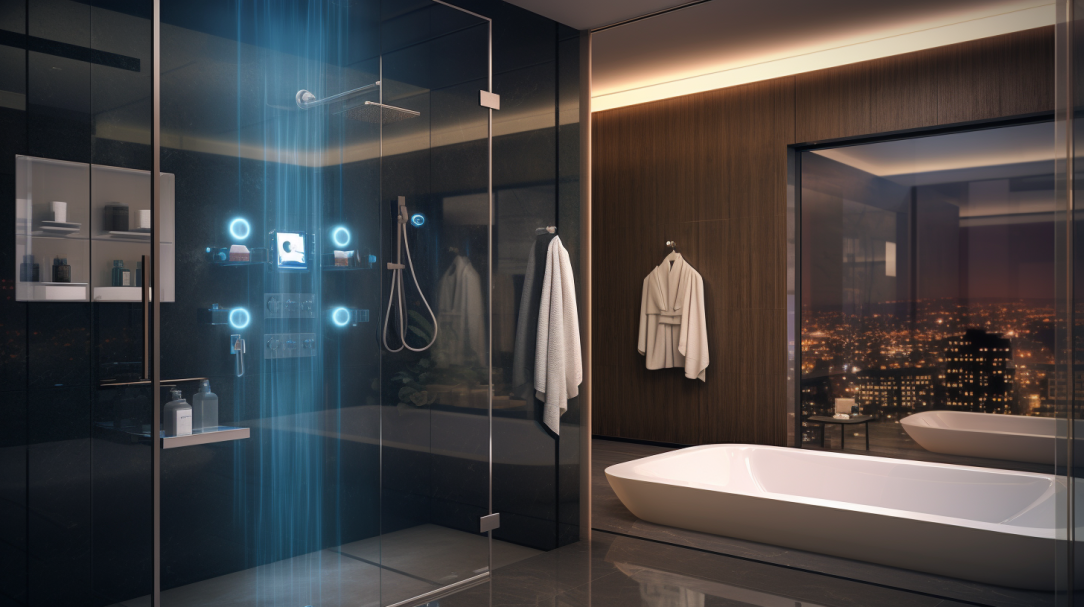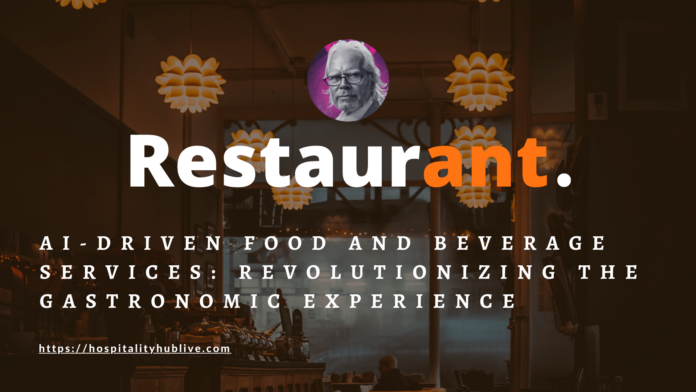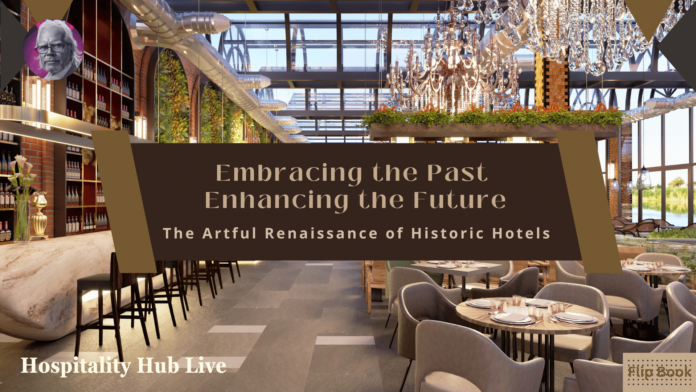Please find below the FREE : Implementing Green Practices in Your Hotel : Flip Book for Download
You are welcome to buy our staff a cup of coffee. No need for Starbucks
— A coffee from the corner shop is ok!
Introduction:
The hospitality industry stands on the brink of a technological revolution, with smart rooms and Artificial Intelligence (AI) heralding a new era of in-room guest experiences.
This paradigm shift is driven by guests’ increasing desire for convenience, personalization, and innovative engagement. In this comprehensive exploration, we examine the emergence of smart rooms, the role of AI in personalizing guest stays, spotlight pioneering hotels, address challenges for hoteliers, and make predictions for the future of this transformative technology
The Concept of Smart Rooms and Guest Expectations
In today’s digital era, smart rooms represent the pinnacle of innovation in the hospitality sector, crafted to offer an unprecedented level of guest-centric luxury. These are not just rooms fitted with the latest gadgets but sophisticated spaces designed to understand and adapt to the nuanced preferences of each guest. The cornerstone of this evolution is AI, which is utilized to fashion a highly tailored and responsive in-room environment.
Guests now seek experiences that are not merely reactive but predictive. Smart rooms, through AI integration, are expected to discern guest needs in advance, customizing the room’s climate, lighting, and even scent to their preferences. The technology extends to personalized recommendations for dining and entertainment within the property, based on guest behavior and expressed interests.
The interfaces in smart rooms are another aspect that underpins the modern guest experience. They are intuitive, blending seamlessly into the room’s aesthetics while remaining accessible. Guests can manipulate every aspect of their environment, from window shades to hot tub temperatures, through voice commands or a simple gesture. Touch panels and mobile applications are becoming standard, allowing guests to control their surroundings with devices they are already familiar with and use daily.
Expanded Section: Role of AI in Enhancing In-Room Guest Experiences
AI’s role in guest experience is multifaceted and ever-expanding. Beyond basic environmental controls, AI serves as a concierge, a butler, and an in-room companion. It learns from guest interactions, making each subsequent stay more personalized than the last. Through intelligent data analysis, AI can suggest an activity itinerary or a relaxation playlist, catering to the mood and preferences of the guest.
Environmental controls powered by AI transcend manual adjustments. Imagine entering a room where the lighting automatically adjusts to a warm, welcoming glow if you arrive during the evening, or a crisp, bright ambiance during the day. Soundscapes can match your schedule, with serene music playing softly as you wake up or an upbeat tune welcoming you back from a day’s outing.
AI also revolutionizes in-room entertainment. With adaptive learning, your favorite genres of movies or music are lined up in your profile. Voice commands have simplified the way we interact with technology, and in smart rooms, a simple spoken request can have the AI system pull up a movie, change a reservation, or order room service.
Additionally, AI enhances in-room experiences by ensuring comfort is both immediate and anticipatory. Smart thermostats adjust in real-time to maintain optimal temperature, while AI-driven systems can predict when a guest will return to their room, ensuring it’s at the desired comfort level upon arrival.
In summary, smart rooms equipped with AI technology are redefining the standards of guest comfort and satisfaction in the hospitality industry. The anticipation of needs, personalized control of the environment, and the sophistication of interactive systems present a compelling narrative of the future, where the guest experience is both luxurious and effortlessly intuitive.
Pros and Cons of Smart Rooms and AI in Hotels
Pros:
- Enhanced Guest Experience: Personalization and efficiency lead to higher guest satisfaction.
- Operational Efficiency: Smart systems can streamline operations and reduce energy costs.
- Competitive Edge: Early adoption of AI can position a hotel as a leader in tech-forward hospitality.
Cons:
- Initial Costs: Substantial investment required for the latest technologies.
- Complexity: Adds layers of complexity to hotel operations and guest service.
- Privacy Issues: Handling of personal information raises privacy concerns.
Predictions for In-Room AI Technology
Looking forward, we envision in-room AI becoming more anticipatory and interactive, with developments like:
- Predictive Comfort Adjustments: AI that preemptively adjusts room settings based on learned guest preferences and external conditions.
- Robotic Assistants: Personal AI butlers that can assist with a wide range of services, from concierge tasks to personal errands.
- Biometric Access and Personalization: Rooms that recognize guests via biometric indicators and automatically adjust to their preset preferences.
FAQs
Q1: How do smart rooms enhance the guest experience in hotels?
A1: Smart rooms offer a new level of convenience and personalization, from voice-activated controls to personalized entertainment, making stays more comfortable and memorable.
Q2: What are some of the privacy concerns associated with smart rooms?
A2: The collection and handling of personal data by AI systems raise concerns about data security and the potential for breaches of privacy.
Q3: Are smart rooms and AI integration only applicable to luxury hotels?
A3: While initially more common in luxury
Conclusion
The integration of smart rooms and AI in hotels is not just a passing trend but a cornerstone of future hospitality experiences. With each innovative leap, the sector edges closer to providing an experience that is not only comfortable and luxurious but also intelligent and intuitive.
For hoteliers, the journey towards smart hospitality is fraught with challenges but ripe with opportunities to redefine what
Case Study: Implementing AI-Driven Smart Rooms at The TechnoLuxe Hotel
Background: The TechnoLuxe Hotel, a forward-thinking luxury hotel located in the heart of Silicon Valley, aimed to redefine the guest experience by integrating AI-driven technology into their rooms. The objective was to enhance guest comfort, streamline hotel operations, and establish the brand as a leader in hospitality innovation.
Challenge: The key challenges for The TechnoLuxe Hotel were to seamlessly integrate advanced technology without compromising the elegance of their rooms, to protect guest privacy while offering highly personalized experiences, and to ensure that the technology was intuitive enough for guests to use without a steep learning curve.
Implementation: In partnership with a leading smart technology provider, The TechnoLuxe Hotel rolled out a pilot program for their premium suite category. Key features included:
- Voice-Activated Control: Guests could control lighting, temperature, entertainment systems, and curtains with simple voice commands.
- Smart Sensors: Rooms were equipped with motion and environmental sensors to adjust settings for energy efficiency and comfort without guest intervention.
- Personalized AI Concierge: An AI-powered system was implemented to learn guest preferences for recommendations on dining, leisure activities, and in-room settings.
- Biometric Access: Rooms utilized biometric scanning, providing secure and personalized access for guests.
- Integrated Mobile Application: A hotel app allowed guests to remotely control room features and access hotel services.
Results: After a six-month trial:
- Guest feedback was overwhelmingly positive, with a 95% satisfaction rate in rooms with smart features.
- Operational efficiency improved by 20% due to the automation of in-room services and energy management.
- The hotel observed a 30% increase in repeat bookings for the smart rooms.
- Guest data analytics from the AI concierge provided valuable insights, enabling more personalized marketing and service provision.
Conclusion: The success of the AI-driven smart rooms at The TechnoLuxe Hotel demonstrated the feasibility and benefits of integrating advanced technology into the hospitality experience. The hotel’s reputation as an innovator attracted tech-savvy travelers and set a new benchmark for competitors. The TechnoLuxe Hotel plans to expand these features to all rooms and continue evolving its smart hospitality offerings.
Future Outlook: Based on the success of the initial roll-out, the hotel’s management is exploring the integration of robotics for in-room service delivery and facial recognition for personalized interactions in public spaces within the hotel. The TechnoLuxe Hotel continues to invest in training its staff to work alongside AI technology, ensuring that the human element of hospitality remains at the forefront.
Discover more from Hospitality Hub Live
Subscribe to get the latest posts sent to your email.












